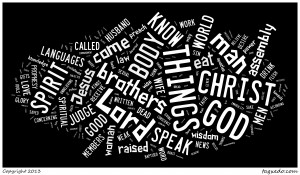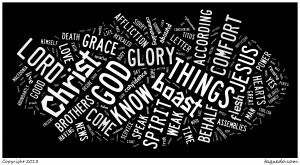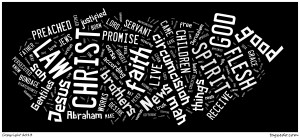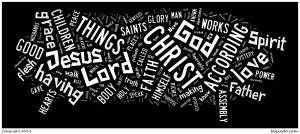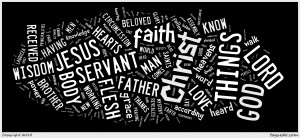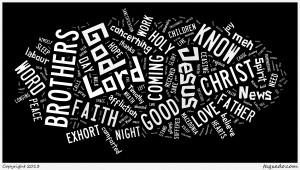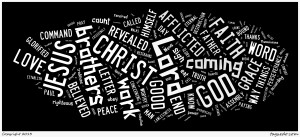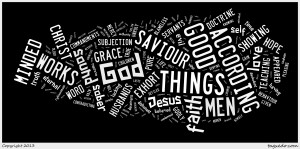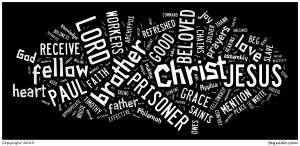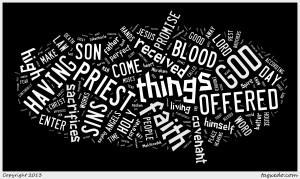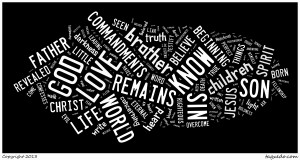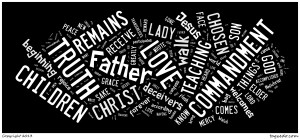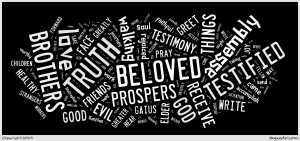This message was first preached on Sunday 26th March 2017 at the 5:30pm fellowship in the Methodist Hall, Dawlish. I later preached this message on Sunday 23rd April at the 6:30pm meeting in Hebron Gospel Hall, Torquay. In addition to the verses quoted, the message was prefaced by a reading from Isaiah 59:1-60:3.
The world was shocked on Wednesday 22nd March when a lone man caused devastation in central London by driving his car through pedestrians and then attempting to gain access to parliament, killing a police officer and being shot dead himself. In that one act and its aftermath, we saw humanity at its worst – a calculated plot to spread terror and panic with scores injured and five dead – and humanity at its best, as the public raced to help the injured, our emergency services leaping into action and a policeman selflessly sacrificing his life to protect others. Since the incident, we have heard from political and religious leaders around the world, condemning the act and declaring that we will not be afraid and that we will not be diverted from our way of life.
This has become almost a stock response to tragedy – particularly terrorism – over the decades, that it is easy to get swept up in the public mood of defiance, but as a Christian I know that it is the complete opposite to what we should be doing … asking deep questions about life and how we live it. However, noble the sentiment, ultimately our leaders are declaring that we have got it right, that the way we live our lives is the correct way. Having been wakened from our slumber as a complicit public, our leaders are desperately begging us to fall back asleep while they continue at the wheel.
Whatever our personal political or ethical views, as Christians we know in our hearts that there is a great deal wrong with the path on which the world is headed. We live globally and locally in an incredibly unequal society, in which the richest people have more money, power and influence than many nations and the majority of the world’s population are either on the breadline or are one missing paycheck away from financial disaster. We live in a society of broken homes, where increasingly children are growing up with one parent; a society riven with addiction to drugs, alcohol, gambling, sex, food, television, shopping – a society rampant with idolatry. It is no surprise that a broken society creates broken and disturbed people and statistical analysis of the ills in society, from teenage pregnancy, through criminal offences, to suicide are all correlated strongly with social inequality.
For all the “business as usual” messages, however, many people will be asking those deep questions about why such a tragedy could have occurred, and will be pondering the fragility of a life where ordinary people can go to work or go sightseeing in the morning and not return home in the evening.
Many people will be angry, in private if not in public, that God – if He exists – could allow such tragic events to happen with the associated heartache and grief. Indeed, suffering of this kind is one of the chief objections against the existence of God – or at least of an all-powerful loving God. We are familiar with the argument: if God cannot prevent the tragedy, then He cannot be all-powerful, yet if He chooses not to prevent it, then He cannot be loving.
As Christians, we know this to be a false dichotomy and that God, thankfully, does not have to measure up to our standards of perfection. We know that such evil is the product of human arrogance, sinfulness and the broken world that we have created – our plan, not God’s and an act of free will that He allows whilst weeping with us in our suffering. Scripture is littered with such examples, notably Job, but Jesus also pulls His disciples up in their erroneous thinking when discussing a local tragedy:
Luke 13:2-5 Jesus answered them, “Do you think that these Galileans were worse sinners than all the other Galileans, because they suffered such things? 3 I tell you, no, but unless you repent, you will all perish in the same way. 4 Or those eighteen, on whom the tower in Siloam fell and killed them; do you think that they were worse offenders than all the men who dwell in Jerusalem? 5 I tell you, no, but, unless you repent, you will all perish in the same way.”
Such objections are not only often hypocritical – imploring God to intervene when anything inconveniences us, but otherwise begging him to leave us to get on with our Godless, idolatrous lives – but they also fundamentally misunderstand how God operates within the world, and it is worth stepping back for a moment and understanding the theology and science underpinning the reality of this.
Science has wonderfully confirmed the basic creation narrative in the last century. Nothing could look more like a Creator God stretching out the heavens, than the Big Bang that cosmologists now believe marks the start of the universe – everything created out of nothing in an instant. More than this, we understand better than ever, thanks to Einstein, the nature of space and time. In particular, time is also part of the created universe and is inextricably intertwined with space. I can only glimpse the faintest shadow of truth relating to the nature of space and time and the implications for how God operates, but two things strike me as immediately apparent.
1. God stands outside space and time, present at every moment simultaneously. This means that God can intervene at any moment including in our past, present and future. God is like the film director who can see every frame of the showreel and can choose to cut out a scene, replace it, introduce a new character or plotline – at any point in the story He chooses. Or, if you prefer, God is like a painter seeing the canvas of space-time and the dog’s dinner of a picture that we have created, but is now painstakingly reworking the whole image according to His design, painting over areas of the canvas, adding in painstaking detail in places – gradually transforming our stories into His masterpiece.
2. God is not constrained by time, but we are, as is evil. Far be it for me to judge God’s work, but time strikes me as a brilliant invention. It is the means by which God contains the effects of evil and apostasy, whilst allowing Him to build a relationship with us and disciple us. Time biases the rules of engagement, ensuring that God, not Satan, wins. It strikes me as tremendously important that from God’s viewpoint, Jesus is even now, simultaneously being crucified for our sins, rising from the dead and seated on His throne.
Thus, objections that God hasn’t intervened to prevent this or that event, forget that He is not constrained to do so by our timescale. It is like looking at a rough cut of a film, or the first wash on a watercolour painting and complaining that it is not very good yet! God is perfecting us, if we let Him, and He will act decisively to establish the new heaven and earth … perhaps the objectors should be careful what they wish for!
Whilst there are those who will seek the opportunity to bash God, there will be many others who will reflect on the transient nature of life. And the true tragedy of the event on that Wednesday is not the loss of life so much as that at least one and probably more of those dead, have died in their sins. And this underscores how much more work we need to do to fulfil the Great Commission to preach the good news of Jesus’ death and resurrection to the world. I don’t know whether they ever heard the gospel message preached powerfully, but we have a generation growing up who don’t know even the basics of Christian faith because their parents have never been taught it.
The risk is that, following the events on that Wednesday and anticipating a backlash against religion, Christians and Christian leaders will withdraw even further from visible mainstream society for fear of offending and will increasingly preach their message to believers behind the closed doors of the churches. This then is the second tragedy – that multiculturalism, instead of being a battleground of ideas and ideologies, where faith and faithlessness are openly debated and in which Christianity holds all the cards – today’s multiculturalism emphasises a private faith and a right not to be offended.
The Christian response to this has to be to reject such a definition of multiculturalism and to refuse to be complicit in playing the role society would have us play – good Christians in the privacy of our own homes and churches, and good citizens in our engagements with wider society. The early Christians faced a no less difficult task in preaching the gospel to a similarly multicultural Roman empire – we probably do not face the risk of being martyred – and from that small but faithful group of followers, Christianity swiftly spread and dominated Western thought for nearly two millennia. We have the advantage over the early Apostles in almost every way, but we need to be willing to follow their pattern in engaging with people in the marketplaces and public squares, offering to the world an explanation for the hope that we have and allowing the Holy Spirit the opportunity to convict those with whom we speak.
Contrary to the assertions of our politicians, the world does not need to carry on as usual in the wake of an act of terrorism – the world needs Jesus and it is our Christian duty to be the hands and feet that take the Christian message in word and deed to all those who need to hear it. This is not something that can be done within the safety of our own churches, or that we can leave for our church leaders to get on with on our behalf. Most of the people we need to engage with have no intention of setting foot in our churches, or coming along to the annual Churches Together open-air service. How then will they know the message of God’s love for them, if we are not to be the ones who speak that truth into their lives through our everyday relationships? Jesus calls us to be a light to the world and that we are not to hide that light away:
Matthew 5:13-16 “You are the salt of the earth, but if the salt has lost its flavor, with what will it be salted? It is then good for nothing, but to be cast out and trodden under the feet of men. 14 You are the light of the world. A city located on a hill can’t be hidden. 15 Neither do you light a lamp, and put it under a measuring basket, but on a stand; and it shines to all who are in the house. 16 Even so, let your light shine before men; that they may see your good works, and glorify your Father who is in heaven.
We need to put ourselves in positions where we can be sensitive to the Holy Spirit guiding our conversation, and we need to learn to be effective evangelists, individually and collectively. A couple of years ago, I picked up a book in the Oxfam bookshop in Teignmouth called “How to make evangelism slightly less difficult”. It appealed to me because the title itself acknowledged that it is no easy task, humanly speaking, to speak about faith with others. One of the central tenets of the book is that for people to be open to receiving the gospel, first their existing set of beliefs needs to be destabilised. In a postmodern world that is increasingly difficult to do – people segment parts of their lives, thoughts and beliefs and are able to hold contradictory viewpoints without too much concern, primarily because they don’t question anything too hard, or perhaps maintain that there is no such thing as truth. This creates a shell that can be difficult to penetrate and it is through loving everyday relationships that we are able to encourage people to let down their guard.
We are all called to have an answer for the hope that we have and each of us Christians has a unique and complementary message, covering the vista of ways in which God calls us and transforms lives. Hence the importance of understanding each other’s stories and being witnesses together. Some people need to hear about the evidence for the historicity of the gospels, some need to hear about lives transformed, some need to experience the warmth of Christian love and generosity, others need to be swept away by music. Jesus sent out his disciples in pairs at least in part so that their strengths and witnesses complemented each other.
The last time I spoke with you was in October, when my message was about returning to a new way of doing church – small local networks of people, flexible and agile enough to respond to local situations and the needs of those we engage with. Since then, a small group of Christians has met faithfully on Saturday afternoons 4-6pm on the Lawn in Dawlish, complementing the work that goes on in the Inspire café and at the Open Daw here in the Methodist church. We take food and hot drinks to share, play Christian music and welcome anyone who wants to come to talk or eat with us. We’ve been richly blessed over the last 5 months and have come to know many of the people marginalised by society and that are so in need of God’s love and hope in their lives. Some folks come for the food, some for conversation, some to just listen to the music, but all find a peace, a love, and an acceptance that they don’t seem to find elsewhere.
We are witnessing some remarkable transformations and it begins with that destabilisation of their world view and identity. For many of these folk, their life-story is one of being uncared for, unlovable, unwanted even by society to whom they are deemed a nuisance. The public protection order on the Lawn is testimony to how little Dawlish wants to do with these people and the fact that the council deny the existence of any homeless individuals, whilst the police deal with rocks being dropped on their shelter and their blankets and sleeping bags are stolen during the day. As I said, we are living in a postmodern world where people happily hold contradictory viewpoints without ever questioning them too hard.
And yet, we can see the self-esteem and self-care of these individuals grow as they come to know a small group of people who love them. And as we come to know them, we learn also about who is best to walk alongside them. I don’t want to give the impression that we are doing anything special – it is God bringing folk each week and the Holy Spirit that is guiding our interactions and conversations – but we need to put ourselves in a position whereby the Holy Spirit can work through us.
The last thing therefore that I want to put to you is a challenge. In what ways are you engaging with people who need to hear the gospel message? In what ways are you putting yourself in a situation whereby the Holy Spirit can work through you to reveal God’s glory to others? And if you are not doing this yet, what is stopping you? You may know the old saying:
“For want of a nail, the shoe was lost; for want of a shoe the horse was lost; for want of a horse the rider was lost; for want of a rider the message was lost; for want of a message the battle was lost; for want of a battle the kingdom was lost. And all for the want of a horseshoe nail!”
We know that spiritually speaking, the battle is won and the kingdom can never be lost. Yet each individual still needs to be won for the kingdom. You are the rider with the message – what is the nail preventing you from delivering that message to the intended recipient?
For want of a rider, the perpetrator of Wednesday’s atrocity was lost and with him any of his victims who had not accepted God’s message of love and reconciliation through Jesus.

 Follow
Follow
